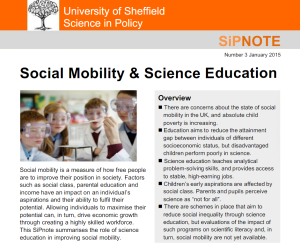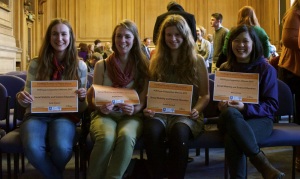Guest post by Katie Grayson, PhD researcher in the Dept. of Molecular Biology & Biotechnology
When I first saw the posters around the department advertising a competition run by the Science in Policy team to write a POSTnote, I thought it would be a good chance to hone my writing skills. But I ended up getting so much more from the process. I picked up skills in multidisciplinary teamwork, communication, and planning and research skills that are very different from my day-to-day science work, and I learned a bit more about how politics and policy works – phew!
Not even knowing what a POSTnote was, I went along to the half-day workshop that kicked off the competition with a lot of curiosity. There it was explained that a POSTnote is a 4-page briefing document providing MPs and peers with balanced and independent information on public policy issues related to science and technology. The majority of MPs don’t have a background in science research and I’d always wondered how scientific information is disseminated in a way that’s effectively and clearly communicated. We learned that the job falls to the Parliamentary Office of Science and Technology (POST) (@POST_UK on Twitter) who write briefings, organise events and assist Select Committees to help parliamentarians examine science and technology issues.
After the workshop we were split into teams of 4 or 5 people and each team was assigned a different topic related to current issues in science policy. I’m from the Dept. of Molecular Biology & Biotechnology, but my teammates were from Animal & Plant Sciences, Geography and Psychology. One thing that struck me was that because of our different training we all approached the task in different ways. This ended up working in our favour by providing balance as different people were skilled at different parts of the task.
What followed was 2 months of frantic foraging through endless policy documents and research articles, picking out the key information and evidence and then presenting it in a clear, non-biased way. Our winning POSTnote topic was ‘Science Education and Social Mobility’. During the course of our research we found that there are huge problems with the perception of science, even amongst young school children. Science is commonly perceived as:
“not for all”
“not needed or relevant in life”
“just for nerds who don’t have a boyfriend”
I found this quite shocking and I think it highlights how important public engagement is in improving public perception of science!
 At the end of the process there was a prize-giving ceremony in which we heard presentations by the 8 teams who had submitted a POSTnote. It was great to hear about all the brilliant work that had been done and everyone deserves credit as the POSTnotes were all of an extremely high standard. Afterwards, there was the exciting opportunity to network with members of POST and the Science in Policy team.
At the end of the process there was a prize-giving ceremony in which we heard presentations by the 8 teams who had submitted a POSTnote. It was great to hear about all the brilliant work that had been done and everyone deserves credit as the POSTnotes were all of an extremely high standard. Afterwards, there was the exciting opportunity to network with members of POST and the Science in Policy team.
At the ceremony, the Rt Hon David Blunkett MP gave a keynote speech in which he emphasised the importance of making sure policy makers receive a clear and accurate message about current science research. He said that it could often be difficult for policy makers to see through the ‘hype’ that can cloud the information they’re given. I discovered that it’s not just the extreme lobby groups that can present very biased information – whilst writing our POSTnote it was extremely difficult to avoid writing anything that was completely uninfluenced by our own opinion on the topic!
While I’m not considering leaving science for a career in politics just yet, the process of writing the POSTnote has allowed me to develop my skills in areas such as in writing, planning and teamwork that will be useful for me in my future science career. As a scientist I feel that I have a responsibility to make sure research and facts are represented properly and I have been inspired to get more involved with public engagement and science policy events. I would recommend anyone to do the same – it’s been a really rewarding experience!
This page has more information on the competition all the submitted POSTnotes (re-branded as SiPnotes).

